Related Research Articles

Albania, officially the Republic of Albania, is a country in Southeast Europe. It is in the Balkans, on the Adriatic and Ionian Seas within the Mediterranean Sea, and shares land borders with Montenegro to the northwest, Kosovo to the northeast, North Macedonia to the east and Greece to the south. With an area of 28,748 km2 (11,100 sq mi), it has a varied range of climatic, geological, hydrological and morphological conditions. Albania's landscapes range from rugged snow-capped mountains in the Albanian Alps and the Korab, Skanderbeg, Pindus and Ceraunian Mountains, to fertile lowland plains extending from the Adriatic and Ionian seacoasts. Tirana is the capital and largest city in the country, followed by Durrës, Vlorë, and Shkodër.
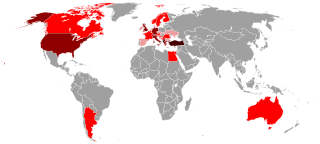
The Albanians are an ethnic group native to the Balkan Peninsula who share a common Albanian ancestry, culture, history and language. They are the main ethnic group of Albania and Kosovo, and they also live in the neighboring countries of North Macedonia, Montenegro, Greece, and Serbia, as well as in Italy, Croatia, Bulgaria, and Turkey. Albanians also constitute a large diaspora with several communities established across Europe and the other continents.

The Balkans, corresponding partially with the Balkan Peninsula, is a geographical area in southeastern Europe with various geographical and historical definitions. The region takes its name from the Balkan Mountains that stretch throughout the whole of Bulgaria. The Balkan Peninsula is bordered by the Adriatic Sea in the northwest, the Ionian Sea in the southwest, the Aegean Sea in the south, the Turkish straits in the east, and the Black Sea in the northeast. The northern border of the peninsula is variously defined. The highest point of the Balkans is Musala, 2,925 metres (9,596 ft), in the Rila mountain range, Bulgaria.
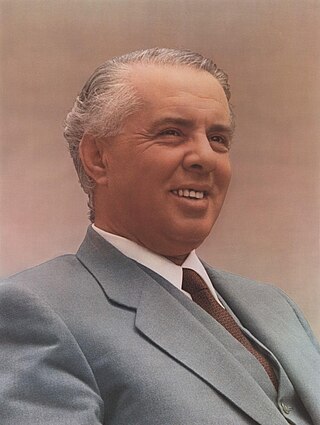
Enver Hoxha was an Albanian communist politician who was the ruler of Albania from 1944 until his death in 1985. He was the First Secretary of the Party of Labour of Albania from 1941 until his death, a member of its Politburo, chairman of the Democratic Front of Albania, and commander-in-chief of the Albanian People's Army. He was the twenty-second prime minister of Albania from 1944 to 1954 and at various times was both foreign minister and defence minister of the country.
The Enchele's polity was the earliest to emerge and centered in Albania. Also the earliest known Illyrian king, Bardylis, emerged in what is now Albania around 400 BC, aiming to make Illyria a regional power interfering with Macedon. He united many southern Illyrian tribes under his realm and defeated the Macedonians and Molossians several times, expanding his dominion over Upper Macedonia and Lynkestis. Before the Rise of Macedon Illyrians were the dominant power in the region. The kingdom of the Taulantii under Glaukias' rule was based in central Albania and dominated southern Illyrian affairs in the late 4th century BC, exerting great influence on the Epirote state through the close ties with the Molossian king Pyrrhus. Under the Ardiaei the greatest known Illyrian kingdom emerged in the 3rd century BC encompassing also northern Albania in its core territory. It became a formidable power both on land and sea by assembling a great army and fleet, and directly ruling over a large area made up of different Illyrian tribes and cities that stretched from the Neretva River in the north to the borders of Epirus in the south, while its influence extended throughout Epirus and down into Acarnania. The dominant power of the Illyrian kingdom in the region ceased after the Illyrian defeat in the Illyro-Roman Wars. The last known "King of the Illyrians" was Gentius, of the Labeatae tribe.

The Kosovo War was an armed conflict in Kosovo that lasted from 28 February 1998 until 11 June 1999. It was fought between the forces of the Federal Republic of Yugoslavia, which controlled Kosovo before the war, and the Kosovo Albanian separatist militia known as the Kosovo Liberation Army (KLA). The conflict ended when the North Atlantic Treaty Organization (NATO) intervened by beginning air strikes in March 1999 which resulted in Yugoslav forces withdrawing from Kosovo.

Kosovo, officially the Republic of Kosovo, is a country in Southeast Europe with partial diplomatic recognition. Kosovo lies landlocked in the centre of the Balkans, bordered by Serbia to the north and east, North Macedonia to the southeast, Albania to the southwest, and Montenegro to the west. Most of central Kosovo sits on the plains of Metohija and the Kosovo field. The Accursed Mountains and Šar Mountains rise in the southwest and southeast, respectively. Kosovo's capital and largest city is Pristina.

Tirana is the capital and largest city of Albania. It is located in the centre of the country, enclosed by mountains and hills, with Dajti rising to the east and a slight valley to the northwest overlooking the Adriatic Sea in the distance. It is among the wettest and sunniest cities in Europe, with 2,544 hours of sun per year.

The flag of Albania depicts a silhouetted black double-headed eagle in the center of a red background. The red stands for bravery, strength, valour and bloodshed, while the Eagle – traditionally the symbol of Albanians – represents the sovereign state of Albania. The flag was established as the national flag of Albania when the country gained its independence from the Ottoman Empire in 1912.

Vlorë is the third most populous city of the Republic of Albania and seat of Vlorë County and Vlorë Municipality. Located in southwestern Albania, Vlorë sprawls on the Bay of Vlorë and is surrounded by the foothills of the Ceraunian Mountains along the Albanian Adriatic and Ionian Sea Coasts. It experiences a Mediterranean climate, which is affected by the Ceraunian Mountains and the proximity to the Mediterranean Sea.
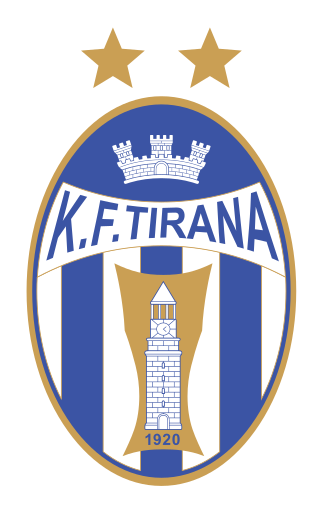
Klubi i Futbollit Tirana is an Albanian professional football club based in the country's capital city, Tirana. The men's football club is part of the multi-disciplinary sports club SK Tirana, and is the most successful in Albania, having won 54 recognised major domestic trophies. They are the only football club in Albania with two stars in their crest after winning the 20th championship in 2003, each star corresponds to ten championships. Making them the first and only Albanian club to have achieved such a feat. They play their home games at the Selman Stërmasi Stadium in Tirana and they play in the Kategoria Superiore.

The Albania national football team represents Albania in men's international football. It is governed by the Albanian Football Association (FSHF), the governing body for football in Albania. It is a member of UEFA in Europe and FIFA in global competitions. The team's colours reference two national symbols: the double-headed eagle and the country's tricolor. Their supporters are colloquially referred to as the Tifozët Kuq e Zi.

The Parliament of Albania or Kuvendi is the unicameral representative body of the citizens of the Republic of Albania; it is Albania's legislature. The Parliament is composed of no less than 140 members elected to a four-year term on the basis of direct, universal, periodic and equal suffrage by secret ballot. The Parliament is presided over by the Speaker, who is assisted by at least one deputy speaker. The electoral system is based on party-list proportional representation. There are 12 multi-seat constituencies, corresponding to the country's counties.
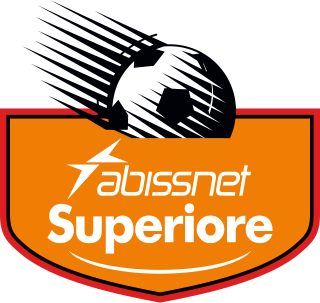
Kategoria Superiore, also known as Abissnet Superiore for sponsorship reasons with internet service provider, Abissnet, is a professional league for men's association football clubs in Albania. At the top of the Albanian football league system, it is the country's premier football competition. It is contested by 10 clubs, and operates on a system of promotion and relegation with the Kategoria e Parë. Seasons run from August to May, with teams playing 36 matches each.

The Kosovo national football team represents Kosovo in men's international football. The team is controlled by the Football Federation of Kosovo, the governing body for football in Kosovo, and is under the jurisdiction of FIFA globally.

Klubi i Futbollit Skënderbeu Korçë is an Albanian professional football club based in Korçë, southeastern Albania. The club competes in the Kategoria Superiore, the top tier of Albanian football. An amateur club named Vllazëria Korçë was found in 1909. The club in its current form was established on August 1926 by Fazlli Frashëri, known as Sportklub Korça, later changing its name to Skënderbeu Korçë, after Albania's national hero Skanderbeg. The club's home ground has been the Skënderbeu Stadium since it was built in 1957, and it now has a capacity of 12,343, of which 5,724 are seated.
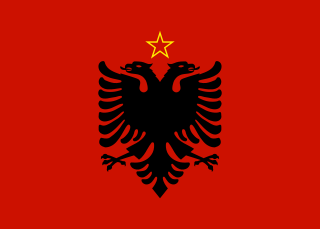
The People's Socialist Republic of Albania, officially the People's Republic of Albania from 1946 until 1976, and from 1991 to 1992 as the Republic of Albania, was the communist state in Albania from 1946 to 1991. It succeeded the Democratic Government of Albania (1944–1946).

Pristina is the capital and largest city of Kosovo. It is the administrative center of the eponymous municipality and district.
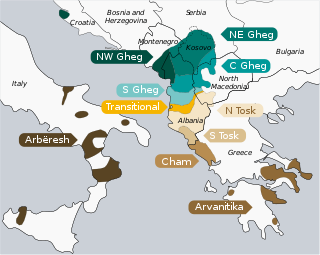
Albanian is an Indo-European language and the only surviving representative of the Albanoid branch, which belongs to the Paleo-Balkan group. Standard Albanian is the official language of Albania and Kosovo, and a co-official language in North Macedonia and Montenegro, as well as a recognized minority language of Italy, Croatia, Romania and Serbia. It is also spoken in Greece and by the Albanian diaspora, which is generally concentrated in the Americas, Europe and Oceania. Albanian is estimated to have as many as 7.5 million native speakers.

Shkodër is the fifth-most-populous city of the Republic of Albania and the seat of Shkodër County and Shkodër Municipality. Shkodra has been continuously inhabited since the Early Bronze Age, and it has roughly 2,200 years of recorded history. The city sprawls across the Plain of Mbishkodra between the southern part of Lake Skadar and the foothills of the Albanian Alps on the banks of Buna, Drin and Kir. Due to its proximity to the Adriatic Sea, Shkodër is affected by a seasonal Mediterranean climate with continental influences.
References
- ↑ "History of Albanian People" Albanian Academy of Science. ISBN 99927-1-623-1